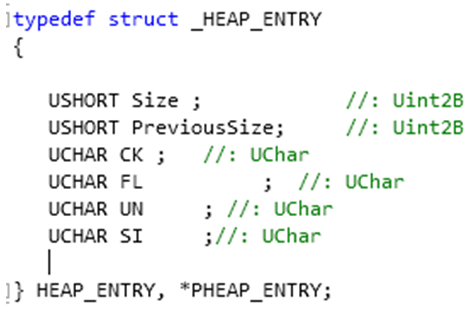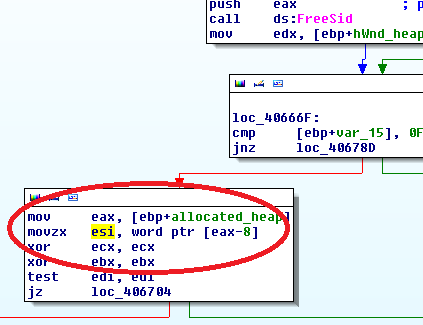to the story: meanwhile, in a zeus trojan. last week i peeked into a zeus just to really quickly
stumble over an anti-debug trick. SURPRISE! kidding.
that anti-debug is really easy to pass by, but wasn’t that trivial to explain; or at least that is what it seems like because i couldn’t find any suitable documentation. and this while the interwebz is full of malware reverser’s write ups.. kidding again.
so here we go...
in a nutshell: the malware would allocate heap memory and use the header of the heap entry as an indicator for an attached debugger. simple, after all. is that frequently used? i don’t know.
but, lets start at the end. the debugger would crash with an access violation when executing invalid arguments. those invalid arguments were produced by an unpacking routine, and it took some runs for brute forcing with IDA Stealth to find a possible root cause: NtGlobalFlag. well known you might think now, and indeed i had some people smiling at me with a yes my dear, thats not tricky at all. but i went on to at least spot the check for this flag, which as for example Mr. Yason described very nicely https://www.blackhat.com/presentations/bh-usa-07/Yason/Whitepaper/bh-usa-07-yason-WP.pdf indicates an attached debugger. guess what, didn’t find that check.
in the first illustration you see the call that causes the exception: EnumWindows, that should call into a handler function, which actually is the unpacked code and turned out to be invalid when NtGlobalFlag is set.
 |
| Exception happening in EnumWindows handler function |
in the unpacking loop: bl being used to XOR the future code
up: ebx initialized with key_init
up: modifying key_init with esi
up: tweaking esi
up: grabbing esi initially from allocated_heap-8
root of all evil: HeapAlloc
so i ended up clueless inside of the RtlAllocateHeap function of ntdll.dll. in fact the value that the malware would grab from memory was initialized by RtlAllocateHeap and i admit it took some staring at the memory to accept the fact that it must be part of the header of the allocated heap block. the memory happened to always be allocated at 9A0688h; the value requested in the code therefor was 9A0680h. i could wonderfully watch the value at this offset turn from 03 to 01 when turning IDA Stealth, specifically NtGlobalFlag protection on or off. and this very value was the cause of crash.
 |
| Value in Question in the Memory Block Header |
here is where moti jumped in and pointed me to the _HEAP_ENTRY structure, which assigns names to the values preceding my heap block:
 |
| The Memory Block Header |
with data_offset-8 one hits exactly the size variable of that structure, which actually contains the size divided by 4 PLUS.. size of management information - like the header for example, which would explain a +1. or additional debug information, which could explain a +3. overall, the allocated buffer size in that particular case is always 14000h (it is dedicated to contain unpacked code later). the size value in _HEAP_ENTRY therefor is 2803h when a debugger is attached, or 2801h without a debugger or IDA Stealth activated.
 |
| Magic happened - Value changed! |
for more information on heap structures check out this article which i found very informative
http://www.informit.com/articles/article.aspx?p=1081496
OR ask your own moti!






Can u please share the md5?
ReplyDeletewhoops.. my bad, here you go 23644588BA7F29A5DCCD29A8711B3A33
ReplyDeletealso was told its a citadel, so not directly zeus bot!
Gr8 10x
ReplyDeleteThanks and I have a nifty offer you: Where To Buy Houses That Need Renovation house renovation edmonton
ReplyDelete